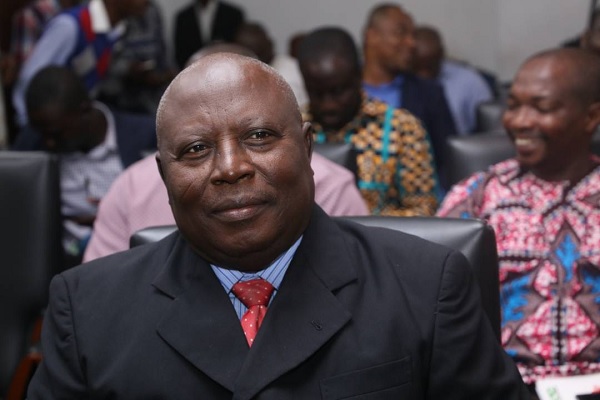
Amidu’s resignation presents lessons — CSOs
Civil society organisations (CSOs) want Mr Martin Amidu’s resignation as the Special Prosecutor (SP) to be used to better the operations of the Office of the Special Prosecutor (OSP).
They described the resignation and the reasons he cited as a learning curve.
Advertisement
The CSOs, including the Ghana Anti-Corruption Coalition (GACC), the Ghana Integrity Initiative (GII), IMANI Africa, a policy think tank, and the Citizens Movement Against Corruption (CIMAG), said Mr Amidu’s resignation had been surprising.
In separate interviews with the Daily Graphic, they said they had thought Mr Amidu could surmount the teething problems that came with the new office, but that was not to be.
GACC
The Executive Secretary of the GACC, Mrs Beauty Narteh, said when the OSP was to be set up, CSOs participated fully by engaging with Parliament and the Executive in the enactment of the law setting up the office.
The stance of the CSOs, she added, was for an OSP tailored after what was detailed in Ghana’s National Anti-Corruption Action Plant (NACAP), which was for an office that was totally independent and not linked in any way to the Attorney-General and Ministry of Justice.
She said because of constitutional prescriptions that made it difficult to have that, except by changing some provisions therein, the CSOs supported the establishment of the OSP and sought to strengthen the enabling act.
“We were all excited by the subsequent appointment of Mr Amidu because we saw him as a citizen vigilante who would inspire others in the fight. It is, therefore, unfortunate that our expectations did not materialise,” she said.
“The resignation, therefore, could become a demotivating factor for citizens in the fight against corruption,” Mrs Narteh added.
She further said: “Given the fact that the President won the 2016 elections on the basis of pledges to fight corruption, to have him indicted in Mr Amidu’s resignation letter does not add up and so the President must speak, so that we all know if he is still committed to the fight.”
She reminded politicians that enacting laws alone was not enough in the fight against corruption, and that making sure the laws were implemented was the most important thing to do.
GII
The Programmes Director of the GII, Mary Awelana Addah, said “episodes of chronicling by the former SP” were writings on the wall pointing to his resignation some day.
She said it was clear, from the turn of events, that during the tenure of the SP, he had not been given the opportunity to operate as he should.
“In fact, some of us believed that he should have overcome the challenges and moved on or resigned much, much earlier,” she said.
She said an ad hoc CSO committee, comprising the GACC, the GII, the Centre for Democratic Governance (CDD) and a host of others, had engaged the former SP at the beginning of his work, during which some of the challenges had been discussed.
IMANI
For the President of IMANI Africa, Mr Franklin Cudjoe, the failure of state institutions, particularly Parliament, which had oversight responsibility for the work of the OSP, had resulted in the SP’s resignation.
“The CSO’s, in their advocacy, had done their best by going to Parliament and engaging the Executive to ensure a functional OSP. What more could we do?” he asked, in response to the question: ‘Did CSOs fail in their advocacy for a functional OSP?’
“Moreover, CSOs’ involvement in the structure of the OSP was not detailed in any law. All we had to do was advocacy,” Mr Cudjoe said.
Among remedial actions, he called for a collective, bipartisan conversation on insulating the office, while urging all citizens to be vigilant and engage actively for good outcomes.
Mr Cudjoe also urged investigative journalists to help in the campaign of unearthing the challenges of such offices and lobbying for redress.
Citizens movement
The Co-Chair of the CIMAG, Mr Edem Senanu, for his part, said although the SP had resigned, his impact in the past year or so should not be downplayed.
He said for the first time in the history of the country, Mr Amidu had been able to follow the paper trail of the Minerals Income Investment Fund (the Agyapa deal) and shown the gaps in it.
That had never happened before, Mr Senanu said, adding that it provided a template by which other agreements of Parliament could be measured.
“Also, we need a new Constitution because a constitution that makes the Minister of Justice the Attorney General is a complicated arrangement,” he said.
Background
Mr Amidu tendered in his resignation as SP last Monday, almost three years into his seven-year tenure to lead the fight against corruption.
He cited “political interference in the independence of his office” as the main reason for his decision to resign.
He also said his office was given inadequate staff who were mostly on secondment, a situation that made it nearly impossible for his outfit to effectively carry out its functions.
In a letter to President Nana Addo Dankwa Akufo-Addo, Mr Amidu said the last straw that broke the camel’s back was the corruption risk assessment he conducted on the Gold Royalties Monetisation Transaction arrangement, popularly referred to as the Agyapa Deal, because of the reaction he got from the Presidency.
“The 64-page analysis of corruption and anti-corruption assessment report disclosed several corruption and corruption-related offences in respect of which I intended to open full investigations as the SP. I cannot do that now after your political interference in the performance of the functions of the office for two weeks, from October 20 to November 1, this year,” the letter alleged.
Writer’s E-mail: [email protected]




